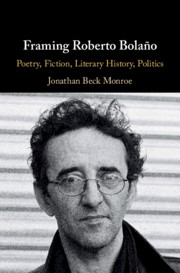Book contents
- Framing Roberto Bolaño
- Framing Roberto Bolaño
- Copyright page
- Dedication
- Contents
- Acknowledgments
- Abbreviations
- Introduction Unpacking Bolaño’s Library
- Part One
- Chapter 1 “Undisciplined Writing”
- Chapter 2 Poetry as Symptom and Cure
- Chapter 3 The Novel’s Regimes Made Visible
- Part Two
- Part Three
- Part Four
- Conclusion From the Known to the Unknown University
- Notes
- Index
Chapter 2 - Poetry as Symptom and Cure
Monsieur Pain
from Part One
Published online by Cambridge University Press: 09 September 2019
- Framing Roberto Bolaño
- Framing Roberto Bolaño
- Copyright page
- Dedication
- Contents
- Acknowledgments
- Abbreviations
- Introduction Unpacking Bolaño’s Library
- Part One
- Chapter 1 “Undisciplined Writing”
- Chapter 2 Poetry as Symptom and Cure
- Chapter 3 The Novel’s Regimes Made Visible
- Part Two
- Part Three
- Part Four
- Conclusion From the Known to the Unknown University
- Notes
- Index
Summary
Written in 1981-82 and published in 1984, Monsieur Pain shares Antwerp’s interest in forms that might combine the prose poem’s characteristic brevity and intensity with the significantly more expansive, still relatively condensed narrative possibilities of the novella. While Antwerp is arguably best understood less as a “novel” than as a parodic assemblage of prose poems, Monsieur Pain marks a pivotal transition toward the former. At the heart of the narrative’s complex of interrelated concerns is César Vallejo’s status as a pivotal figure in the history of twentieth-century poetry. Situating the narrative’s fictive world in the specific context of Vallejo’s last days in “PARIS, 1938,” Monsieur Pain presents the reader, in its own segmented, prose-poetic fashion, with an intricate form of figuration and representation inseparable from its conceptual, affective, psychoanalytic, philosophical, social, historical, political, economic, narratological stakes and implications. Through its comical yet serious, labyrinthine imagining of Vallejo’s absurd passing, dying of “hiccups” yet “anchored in the real world,” Monsieur Pain affirms the continuing capacity of poetry, if not to cure, then at least to engage the urgent issues and questions of its time, of Vallejo’s, of Bolaño’s, of our own.
- Type
- Chapter
- Information
- Framing Roberto BolañoPoetry, Fiction, Literary History, Politics, pp. 36 - 49Publisher: Cambridge University PressPrint publication year: 2019

